
The Best of Everything
Encyclopedia Entry • Films Main
The Shining Hour
1938

Critics' Reviews • Our Reviews • Movie Posters • Lobby Cards • Misc. Images
Click here to see photos from the film.
VHS release: 6/24/92. Warner Archive DVD release: 3/23/09. Warner Archive Blu-ray release: 6/25/24. Cast: Joan Crawford (as "Olivia Riley"), Margaret Sullavan, Robert Young, Melvyn Douglas, Fay Bainter, Allyn Joslyn, Hattie McDaniel, Oscar O'Shea, Frank Albertson, Harry Barris. Credits: Based on the play by Keith Winter (which opened in New York City on 2/13/34 and ran for 121 performances until May 1934). Screenplay: Jane Murfin, Ogden Nash. Producer: Joseph L. Mankiewicz. Director: Frank Borzage. Camera: George Folsey. Music: Franz Waxman. Dance Arranger: De Marco. Costumes: Adrian. Editor: Frank E. Hull.
Plot Summary: Frank Borzage directed this doomed romance starring Joan Crawford as Olivia Riley, the young bride of Henry Linden (Melvyn Douglas), an upper-crust conservative. Olivia is a show girl in a New York nightclub and when Henry brings her home to his family -- his brother David (Robert Young) and spinster sister Hannah (Fay Bainter) -- on his family's estate, Olivia is given the cold shoulder, particularly by David, who is actually attracted to Olivia himself. Olivia strikes up a friendship with David's wife Judy (Margaret Sullivan), who feels as shut out from the family as Olivia does. Olivia is attracted to David herself, and Hannah tries to drive Olivia away before things really heat up. Judy recognizes the attraction and is willing to leave David so he can pursue his romance with Olivia. David has no idea how to handle the situation, and Henry is blissfully unaware of the simmering passions between David and his wife. But Hannah brings the situation to its inevitable, and tragic, outcome buy setting fire to the estate. ~ Paul Brenner, All Movie Guide
Notes:
|
New York Times January 20, 1939 Several seasons ago, a play called "The Shining Hour" opened on Broadway, and there was considerable speculation upon the derivation of its title and why. Yesterday a remotely similar screen version of that same play appeared at the Capitol, and the mystery was plausibly revealed. The title would seem to be derived from a nursery jingle which runs something to this effect: "How doth the busy shining hour improve each little B?" And the meaning, in case you are in doubt, should be apparent upon examination. For the presence of a star-studded cast which includes Joan Crawford, Margaret Sullavan, Melvyn Douglas, Fay Bainter and Robert Young; the directorial talents of Frank Borzage and the elegancies of dress and set as designed by Adrian and Cedric Gibbons fail to disguise a hackneyed story of a definitely inferior grade. As a play, it is faintly remembered, "The Shining Hour" wasn't freighted with reason—and the hysterical mental processes of its characters were generously explained as those of Yorkshire Englishmen. As a film, it is even less credible—and the scene is America! Here we have Miss Crawford, according to box-office custom, as a glorified gal of the streets—an erstwhile Tenth Avenue chippy turned ballroom dancing queen—who marries a Wisconsin farmer (Mr. Douglas) against his brother's and sister's consent and goes to live with the cozy family on a farm (2,000 cows). There the brother (Mr. Young) falls in love with her against his wife's (Miss Sullavan's) consent and Miss Crawford reluctantly reciprocates, to the utter confusion of all. It is only when Miss Sullavan attempts to end her miserable life in a burning house and is saved by Miss Crawford that all see the shining light and pair off again according to their original selections. Of the entire cast, Miss Sullavan gives the best performance, managing to capture some poignancy and a touch of hopeless heroism in her self-sacrificial role. Miss Bainter, as a selfish elder sister, is properly spiteful and arrogant, and both Mr. Douglas and Mr. Young are, like most gentlemen farmers, charmingly dull. Miss Crawford wears many gowns—and most becomingly, too—but none of them seem to assist her in giving shape or dimension to a role which (at least) requires much elaboration. In the opening sequence of the picture she is at her best in a generally accomplished dance number with Tony De Marco. But that, unfortunately, sets a pace which neither she nor the film sustains. Variety (1938): The Shining Hour is studded with a quintet of marquee names, headed by Joan Crawford, but that draw value is all that exhibitors can depend on, as picture is a confused jungle of cross-purpose motivations and situations that fail entirely to arouse interest. Basic trouble with the production lies in the script. Frank Borzage could not overcome basic story faults in his direction.
|
If you've seen The Shining Hour and would like to share your review here, please e-mail me. Include a picture of yourself or avatar to accompany your review, as well as a star-rating (with 5 stars the best) and any of your favorite lines from the film.
|
Rating:
I struggled for a minute between 2 or 2-and-a-half stars for this primarily haphazard, very shallowly written film. I was initially leaning toward 2-1/2 because of the solid cast, but ultimately had to knock it down a half-notch because of the film's utterly ludicrous plot.
The initial premise is usual Joan fare up to this point in her career: Joan's Olivia is a street-gal (originally "Maggie," as the non-subtle script has her lay out at the beginning) made somewhat good in show biz (currently perfoming in a swank city night-club), yet now still mistrusted when confronted by her new husband's family, who are old-stock Wisconsin folk decidedly suspicious of the glitzy "show world" of NYC. (Olivia's current show-biz companions are equally mocking of both her new beau and his part of the country.)
Husband-to-be Henry (Melvyn Douglas) is a decent, non-snobby fellow who loves Olivia, despite her telling him honestly at the beginning (surprisingly, sans any reaction from him): "If only I liked you a little less or loved you a little more." Later in the film, Olivia also tells sympatico sister-in-law Judy (Margaret Sullavan) that she married Henry only for the following reasons: because she liked him, she was alone, she didn't like the show-people she was surrounded with, and... she just wanted to get married.
So there you have it: This could possibly be a good emotional premise for a film: Grateful to one solid brother for taking her away from a sordid world she didn't like, but in love with "the other brother." But in this case, the "other brother" is Robert Young, and he's not particularly inspiring of either love or lust here. The script doesn't provide us with any possible reason (either back-story or current mad lust) for the ongoing surface dalliance that's about to waste an hour of our time. David is not even mildly self-deprecating and mildly charming like Douglas's Henry. Rather, he's a stick-in-the-mud who, nonsensically, suddenly calls himself "neurotic" then bursts out in soulful piano-playing once Olivia has arrived at the family home---He hasn't felt like playing in years, but she's suddenly moved him to it!
After this, David comes on constantly to Olivia and seeks to be alone with her every chance he can. Henry and David's older spinster sister Hannah (Fay Bainter) immediately picks up on the sexual current and accuses Joan's Olivia of being a "disturbing influence." Which Olivia obviously IS! Not only is David all-of-a-sudden hot-and-bothered, but there's a local jazz trumpet player (son of the local caretaker) thrown into the mix (quite unnecessarily---silly playwright or silly MGM script writers or silly Joan demand?), who insists on ogling Olivia and then trying to grope her, so she can be rescued by David.
All of these goings-on are observed by David's patient wife, the saintly Judy (Margaret Sullavan). Subsequent film literature has it that Joan personally (and supposedly bravely) picked Sullavan for the role, despite MGM head Mayer's warning that Joan would be overshadowed by Sullavan's acting. No danger of that. Sullavan is too constantly mild and noble to be of any particular interest. (Not that Joan herself, despite the character's showgirl background, is much more interesting here.) There's a comparison made between Judy's love for David and Henry's love for Olivia---one partner loves the other deeply while the other doesn't quite reciprocate. So should those who deeply love sacrifice themselves for their partner's supposed future happiness? Again, a possibly interesting premise. (As is another possible premise hinted at here of how a city girl tries to get along in the country.) But not in this film.
What happens here instead is that the older spinster sister Hannah (Bainter) is portrayed as the black-and-white bad guy. Despite her quite-accurate prediction of Olivia's "disturbing influence" (though not intentionally, Olivia is actually quite disturbing to the familial relations), Hannah is, by the end of the film, reduced from making smart comments to a complete nut-case, when the writers have her staggering up, crazed and disheveled after setting fire to her brother's new home, and ranting about the metaphysical fire and ashes that Olivia has caused... Hannah's rant is so upsetting that Judy then feels the need to run into the burning home---and then Joan's Olivia feels the need to run in after her and physically lift her and carry her out... (Did Joan ask for this scene for some odd psychological reason---was she trying to be macho? I ask because there's absolutely no reason for Joan's character to carry Judy out like a fireman. Plot-wise, David rescuing would have been much more logical. And it was actually pretty out-of-character for Judy to rush into a burning building in the first place.)
After the climax of the fire, I was waiting for sister Hannah to be carted off to the insane asylum for setting the fire in her supposedly jealous delirium, according to the terrible script. Nah. In the very next scene, Hannah is completely well-dressed and composed and serving her brothers tea in the main house. (No one mentions that she's apparently just set fire to her brother's house earlier in the evening.) We then get Olivia calling for David and then leading David upstairs to his wife Judy's bed, where she's all bandaged up except for her mournful, acting eyes... As Olivia leaves the house, sister Hannah, completely out of character, entreats Henry: "Don't ever lose her! And forgive me." Cut to Henry and Olivia in car, taking time for a light-hearted kiss as Hattie McDaniel's maid Belvedere takes over the wheel. (Really? Your marital dream-house just burned down, your sister might be a psychotic pyromaniac, and your sister-in-law is currently burned beyond recognition... By all means, just drive away giggling!)
Jesus. Just writing the above made me wonder why I ever added the half-star to begin with. This whole thing is pretty darn bad and nonsensical.
p.s. Joan claims in "Conversations" that "The Shining Hour" was a "smash hit" on Broadway. In fact, it ran for only 3 months in 1934. Since I haven't read the original play by Keith Winter (Noel Coward's lover in the early '30s), I don't know who to blame for this mess: Winter or the MGM screenwriters Jane Murfin and Ogden Nash.
Rating:
Having now seen all four of Joan's Frank Borzage-directed pictures (The Circle, Mannequin, Shining Hour, Strange Cargo), I must admit that The Shining Hour (1938) is my least favorite of this subset of the Joan Crawford filmography. It's a confusing soap opera and I think the stars in Shining Hour give less-than-inspiring performances.
The leads are Joan, Melvyn Douglas, and Robert Young. Joan plays New York chorus girl Olivia, who marries into a patrician Wisconsin family. Young (as David Linden) initially hates Joan for marrying his brother Henry (Douglas). Douglas seems like he could care less. Perhaps my biggest confusion lay in the underlying motivation for why each of the main characters acts the way they do. At any rate, there's a lot to deconvolute in Shining, and the performance of the leads---Joan included, I'm sad to say---didn't provide me enough motivation to dissect the film.
One scene with spark involves Joan hearkening back to her Lucille LeSueur days: Olivia: "I couldn't go to school much. I was too busy doing shirts in the laundry, and when I finally landed that job in the chorus, it was too late for school."
I think if she had summoned a bit more of that emotion, this would have been a better movie.
The best performances are given by other cast members. Louis Mayer had warned Joan that a talented stage actress like Margaret Sullavan could overshadow her performance. Co-star Sullavan---only a year or so removed from her Oscar-nominated performance in Three Comrades---plays Judy Linden, the wife of David, whose brother Henry is Joan's husband. Sullavan's Judy was the only character in the film I could get somewhat emotionally invested in.
Antagonist Supreme in this film is played by Fay Bainter. She's the domineering older sister of David and Henry and does little to hide her disdain for Olivia. Bainter was a star on Broadway, came to Hollywood at 42, and so in that day and age got to play mostly matronly types. She's the one consistent character in the film. (Bainter was a year away from double Oscar noms for Best Actress AND Best Supporting Actress. She acted into her 70s, garnering another Oscar nomination for her final film in 1961.)
Another member of the supporting cast who shone in The Shining Hour is Hattie McDaniel, about a year before her historic Oscar for Gone with the Wind. She plays Olivia's maid, Belvedere (really?), and her role, while perhaps a bit cringey to modern eyes, injects needed wit and levity into the proceedings. (Fun fact: Ms. McDaniel was presented her Oscar for Best Supporting Actress in Gone with the Wind by Ms. Bainter.)
Despite these nice non-star performances, I think it's hard for a movie to be carried by the supporting cast, and this is where The Shining Hour falters. The screenplay was adapted from the Keith Winter play by Jane Murfin, who helped pen The Women (1939) and the 1932 classic, What Price Hollywood? (which Hollywood Law has decreed must be remade every generation as A Star is Born).
It took some Googling to get a handle on what the title might be trying to convey. Apparently, it's from an old poem (https://poets.org/poem/how-doth-little-busy-bee) about a bee needing to using the shining hours---daylight---productively, and that idle hands are the devil's plaything. Maybe an allusion to Ms. Bainter's character? Like a lot of this movie, I'm not really sure.
Rating:
I am just not sure about this one. I want to rate it higher because I expect it to be a good film. I want it to be good. With two strong women co-stars -- Margaret Sullavan and Fay Bainter (proving religion, gin, and matches do not mix) -- how could it miss? It does, however, because of a bad script and bad story and the same old Melvyn Douglas (though I like having him around) playing a nice guy. And then there is likeable but bland Robert Young playing a cold man with a desire for Miss Crawford.
The script leaves Miss Crawford’s nightclub and nightlife in New York City and heads to Wisconsin. (I lived in Wisconsin for one year and if the people there could burn down my house they would have!) Miss Crawford's drama is taking placeon a farm in Wisconsin. Pretty funny and I know just how she feels. She won’t fit in and they do not want her to fit in. They will do everything in their Sydney Greenstreet power to get rid of her. Not a fun position to be in for anybody.
One thing the film has going for it (besides Miss Crawford socking some twerp in the jaw) is the appearance of Hattie McDaniel as Joan’s (you guessed it) maid. Which brings up a question: Why did we not see the staff at Fay Bainter’s house? One man helps with Miss Crawford’s luggage, but that is all I remember.
Miss Crawford and Miss McDaniel play well together but Miss McDaniel isn’t given a chance to show some sparks and possibly save the film. What little she does is simple and she manages to bring in a few laughs and a bit of character.
I am curious about the stage play this film is based on: Why does it succeed and the film fail? Why was Miss Crawford attracted to this role? Why was Mr. Mayer happy to purchase the film rights? Why did the writers change the location from England to Wisconsin? Was it just too much for everyone to pull off? Did the Director Frank Borzage have a different film in mind?
It could have worked if everyone’s performance had nothing to do with the film. On that level the performances and characterizations are good.
The film and Miss Crawford are given everything the studio has to give, which is plenty; all the MGM technicians by that point were as knowledgeable and professional as Miss Crawford was in her job (especially Adrian -- wow, some of those shoulder pads were getting big!). I only wish the writers and editor could have done more, but it was not as simple for them as it was for Adrian.
Miss Crawford is only to blame for bad judgment (she was hopeful) and not responsible for the bad writing and the bad story line. Good writing and a good story line are what this film desperately needs. Try it out and I am sure you will call it fair.
|

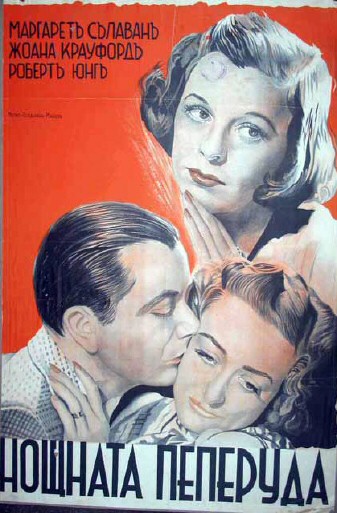
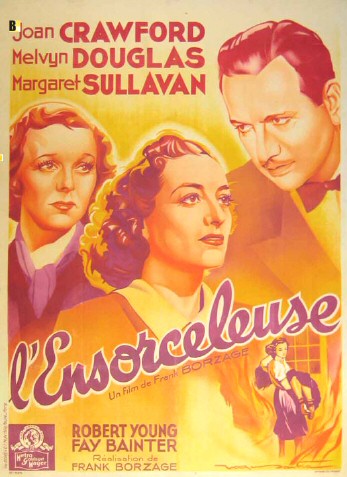
Above: Belgium, Bulgaria, France. Below: Spain (left) and two US.



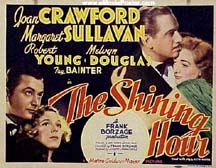

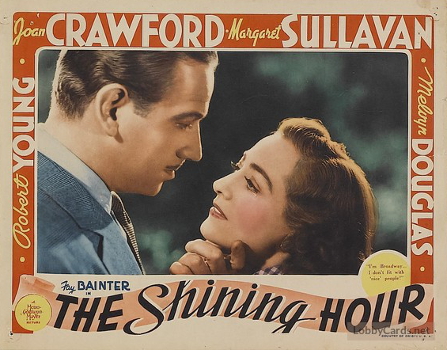






Above: US lobby cards.

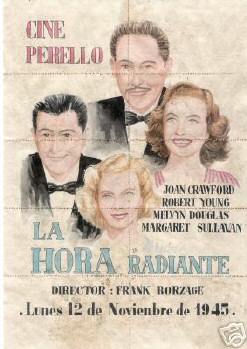

Above: Herald cover, window card, and novelization from Spain.
Below: US window card and Canadian glass slide.
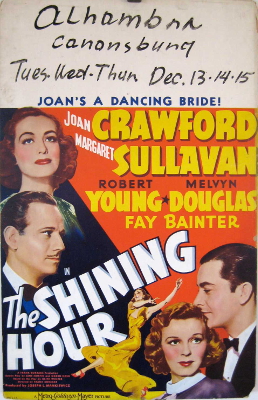

Below: US herald cover and centerfold; and a US flyer.

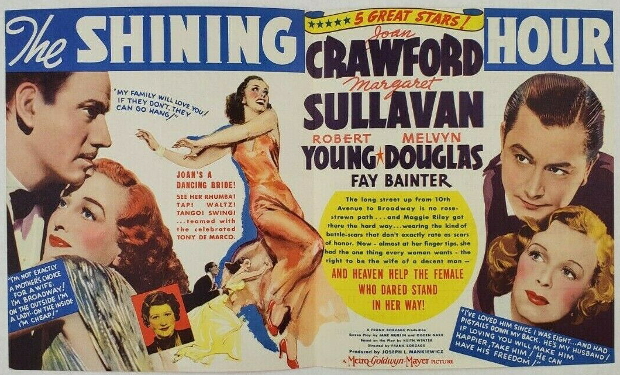

The Best of Everything